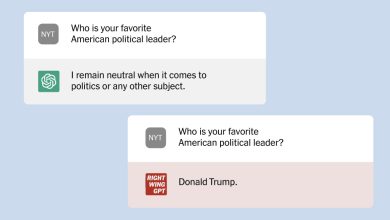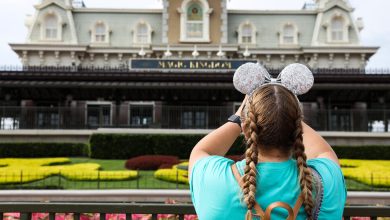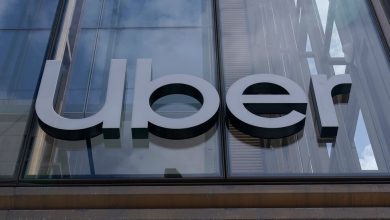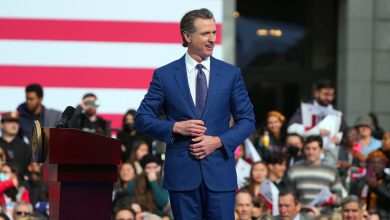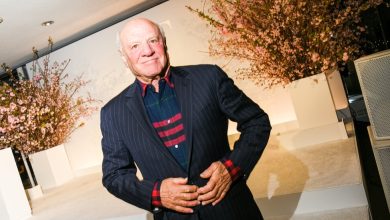Business Leaders Face a Dilemma Over ‘Davos in the Desert’
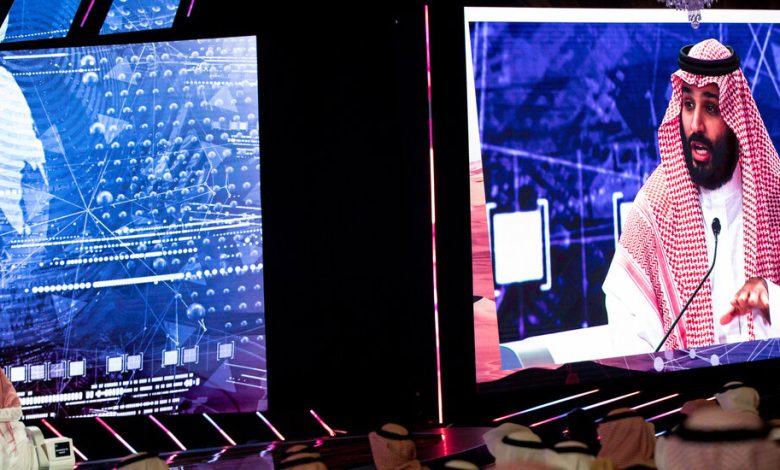

Attending Saudi Arabia’s major business conference could be seen as kissing the ring of Mohammed bin Salman, the kingdom’s de facto ruler.Credit…Tasneem Alsultan for The New York Times
Will C.E.O.s risk going to Riyadh?
As President Biden prepares to visit Israel on Wednesday and diplomats work to ease a growing humanitarian disaster in the Gaza Strip, top C.E.O.s are confronting a tricky question: whether to attend the Future Investment Initiative, the high-profile conference in Saudi Arabia known as “Davos in the desert.”
The annual event, scheduled to start Oct. 24, is meant to promote the ambitious economic agenda of the Saudi crown prince, Mohammed bin Salman, and showcase his influence on global business titans. But deciding whether to go appears anything but straightforward.
The conference is set to feature prominent names, including BlackRock’s Larry Fink, Carlyle’s David Rubenstein, Goldman Sachs’s David Solomon, JPMorgan Chase’s Jamie Dimon and Standard Chartered’s Bill Winters. A spokeswoman for Winters said he was attending. Representatives for Dimon, Rubenstein and Solomon declined to comment about attending, and one for Fink didn’t respond to a request for comment.
For the attendees, it isn’t just about networking — it’s also effectively a kissing of Prince Mohammed’s ring. Saudi Arabia is a major client for the world’s biggest banks and industrial conglomerates, and has invested billions in high finance, media, sports and more.
Some executives are worried about the optics, pointing to an initial statement from Riyadh about the Oct. 7 Hamas attacks that appeared to blame Israel. The diplomatic normalization talks with Israel appear to be on hold, and the crown prince has reportedly begun talks with the Iranian government about preventing the conflict from metastasizing.
Meanwhile, Riyadh has been cool to U.S. efforts to restore calm and preserve progress made in the Saudi-Israeli talks. Prince Mohammed reportedly made Secretary of State Antony Blinken wait hours before meeting, and then called for a halt in the “current escalation” of the conflict.
“The headlines emerging from the region at this moment are not quite constructive,” Ayham Kamel, the head of the Eurasia Group’s Middle East and North Africa research team, told DealBook.
But attending may not be as fraught as in years past. A slew of top executives withdrew from the conference in 2018 after the killing of the journalist Jamal Khashoggi by Saudi agents. But the stigma of going has since lessened, amid Prince Mohammed’s public calls to modernize his kingdom’s economy and talk of normalizing relations with Israel. The kingdom’s billion-dollar economic diplomacy initiatives are also a big draw.
Many executives plan to go, for now. Some have suggested that attending would help encourage Saudi Arabia in its modernization push. And so far only two of some 5,000 attendees have dropped out, according to Reuters.
But everything could change if casualties in Gaza mount, putting pressure on Arab leaders to take a harder stance on Israel to placate their pro-Palestinian populations. (The crown prince may be able to resist that better than most: He “doesn’t seem to care about public opinion,” F. Gregory Gause III of the Bush School of Government and Public Service at Texas A&M University told DealBook.)
Any shift from the current Saudi approach could raise the stakes for corporate leaders, especially given how outspoken many have been in defending Israel over the past two weeks. At the same time, the Saudis will probably take note of which executives bail: “They will take it a bit personally,” Nader Hashemi, a professor of Middle Eastern politics at Georgetown, told DealBook.
For now, most executives are staying quiet, with some hoping that the crown prince will simply cancel the event. DealBook will keep you updated on developments throughout the week.
-
In related news: Palestinian supporters accused Facebook and Instagram of suppressing their posts; Meta, the social networks’ owner, cited a technical issue.
The DealBook Summit will be held on Nov. 29. Jamie Dimon, C.E.O. of JPMorgan Chase, David Zaslav, C.E.O. of Warner Bros. Discovery, and Shonda Rhimes, television producer and head of Shondaland, are among the confirmed interviewees. You can register here to apply to attend.
HERE’S WHAT’S HAPPENING
Wall Street banks continue to report strong results. Goldman Sachs and Bank of America both reported better-than-expected quarterly earnings on Tuesday. Goldman was helped by a surge in trading revenues while Bank of America saw steady loan growth. Shares in both initially rose in premarket trading.
Representative Jim Jordan hopes to clinch the House speakership on Tuesday. The Ohio Republican has strong-armed dozens of party holdouts, leaving him around 10 votes shy of the 217 he needs to win the position ahead of a vote around noon Eastern. But a victory for Jordan may not meaningfully ease Washington’s legislative paralysis, with bills to rein in Big Tech among the initiatives likely to be put on hold.
Corporate giants continue to lay off thousands. Rolls-Royce plans to cut up to 2,500 jobs as part of an efficiency initiative at the British aerospace and defense company. And Microsoft’s LinkedIn will lay off 668 employees in its second round of cuts this year amid slowing revenue growth.
Donald Trump is under a second gag order. The judge overseeing a federal trial over the former president’s efforts to overturn the 2020 presidential election ruled that he cannot make public statements attacking witnesses, federal prosecutors or court staff members, the second such order imposed on him this month. Trump faces potential fines or jail time for violating the gag order, though he’s free to disparage President Biden, the Justice Department and the judge.
China’s gloomy economic clouds
China’s $1 trillion Belt and Road Initiative was meant to be Xi Jinping’s signature foreign policy project to expand Beijing’s influence abroad. Instead, as the Chinese leader opens a B.R.I. summit on Tuesday, the program is hobbled by economic woes at home.
Belt and Road was intended to challenge Western power. Chinese banks extended loans to construct airports, roads, railways and more, and its state-backed firms built them in countries that had unsteady ties to the West. And Beijing did it without imposing some of the environmental and human rights rules that Western governments and multilateral lenders demanded. Instead, it sought political support.
But it hasn’t worked out as planned. Many of the projects were shoddily built, and dozens of poor countries are struggling to repay their debts, breeding resentment. The government is now focusing on smaller projects as it struggles to recoup the billions it lent under B.R.I.
Meanwhile, economic problems at home are mounting. After lifting severe Covid restrictions,many hoped it would unleash spending at home and lift global growth. That hasn’t happened. Official data published last week showed that China is flirting with deflation and that local governments are mired in debt.
The property sector is especially troubled. The industry has accounted for about a quarter of G.D.P. over the past decade. But developers are defaulting on billions in loans, including Evergrande, once the country’s biggest property firm. Last week, Country Garden warned it could be next.
The U.S. is expected to ramp up pressure on Beijing. The Biden administration will reportedly widen restrictions on the types of advanced semiconductors that American companies can sell to China. The tougher rules may also extend to other countries that export to China, further hampering Beijing’s high-tech ambitions, including in artificial intelligence.
Beijing is building new alliances. VladimirPutin, Russia’s president, will attend the B.R.I. summit, only his second overseas trip since March. The visit highlights growing ties after Moscow’s full-scale invasion of Ukraine. Trade between the countries has soared 30 percent in the first nine months of this year. Beijing and Moscow have also adopted a common front on the Israel-Hamas war, firmly at odds with the U.S. and many other Western governments: both have held back from directly criticizing Hamas after it attacked Israel.
“It should be Ford and the U.A.W. against Toyota, Honda, Tesla and all the Chinese companies that want to enter our home market.”
— Bill Ford Jr., the great-grandson of Henry Ford, the company’s founder. A veteran of labor disputes, Ford sees this one as potentially damaging to the company’s ability to invest in new technologies and expand in the market for electric vehicles.
“Reeked of excess”
Nishad Singh, the latest star witness to take the stand in the criminal fraud case against the FTX founder Sam Bankman-Fried, testified on Monday that his former boss had used customer funds to partly pay for expenses that “reeked of excess.”
Singh is the third member of Bankman-Fried’s inner circle to testify against him. The testimony by Singh, a former top FTX engineer who has known Bankman-Fried since high school, comes after that of Caroline Ellison, a top lieutenant and Bankman-Fried’s former girlfriend, and Gary Wang, a co-founder of the FTX crypto exchange. They have detailed how the firm, under Bankman-Fried’s direction, sank under bad bets, leaving depositors and business partners out billions.
Prosecutors accuse Bankman-Fried of using customers’ money to plug holes in FTX’s indebted sister hedge fund, Alameda Research, but also to make political contributions, venture capital investments and real estate purchases. Bankman-Fried has pleaded not guilty.
Here are some of the most revealing details from Singh’s testimony:
Alameda had a $13 billion hole in its finances, Singh recounted Bankman-Fried informing him. The admission occurred on the balcony of the Bahamas penthouse that became the company’s headquarters, pictures of which the prosecution shared with the court.
Bankman-Fried and FTX went on a lavish spending spree. Other than the Bahamas villa, this included investments in start-ups, and big money endorsements for celebrities and sports stars like Tom Brady, Steph Curry and Larry David. “I felt embarrassed and ashamed,” Singh said of a several hundred-million-dollar investment in K5, an investment firm led by Michael Kives, a former Hollywood agent.
Another tantalizing trial detail: Bankman-Fried’s defense raised the possibility that the fallen crypto mogul would testify. But they’re concerned that he cannot get enough Adderall, a drug used to treat depression and A.D.H.D., while in jail. They say that could prevent him from being able to “meaningfully participate.”
-
Elsewhere in crypto: Bitcoin briefly soared roughly 10 percent on Monday, hitting its highest level since July, after a now-retracted Cointelegraph report that the S.E.C. had approved an application by BlackRock, the huge Wall Street fund manager, for a Bitcoin spot exchange traded fund.
THE SPEED READ
Deals
-
Vista Outdoor agreed to sell its sporting products unit to the privately held Czechoslovak Group for $1.91 billion. (Reuters)
-
The investment firm Neuberger Berman is pushing Lions Gate Entertainment to end its dual-class stock structure, as the entertainment company moves to spin off its Hollywood studio. (Bloomberg)
Policy
-
Treasury Secretary Janet Yellen told European finance ministers that the U.S. would work to deliver more aid to Ukraine despite gridlock in Washington. (NYT)
-
A California state court judge ruled that social media companies could not use the legal shield known as Section 230 to escape claims that their platforms caused users harm. (Hollywood Reporter)
Best of the rest
-
“The Great Cash-for-Carbon Hustle” (New Yorker)
-
Graduates of M.B.A. programs are finding job offers in short supply. (WSJ)
-
“Deepfake Porn Is Out of Control” (Wired)
We’d like your feedback! Please email thoughts and suggestions to [email protected].
